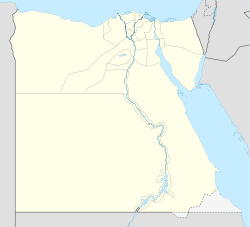- ‘Aydhab
-
‘Aydhab Location in the Hala'ib triangle Coordinates: 22°19′51″N 36°29′25″E / 22.33083°N 36.49028°ECoordinates: 22°19′51″N 36°29′25″E / 22.33083°N 36.49028°E Country Administered by Egypt, claimed by Sudan. ‘Aydhab (also Aydhab, Aidab) was an important medieval port on the west coast of the Red Sea. The abandoned site of the town is located in the disputed Hala'ib triangle.
History
Possibly established during the Ptolemaic period, ‘Aydhab was occupied by the Beja before its conquest by Fatimid Egypt in the 10th century.[1] It was located about 20 kilometers north of the modern port Halayeb.[2] Abulfeda gave its coordinates as 21°N, 58°E[3]: it is actually located at 22°19'N, 36°28'E.
‘Aydhab became an important port for eastern trade (particularly with Yemen) and for Muslim pilgrims from Africa on their way to Mecca during the 10th and 11th centuries for a number of reasons. First, the rediscovery of the Egyptian mines of the Wadi Allaqi led to a gold rush between the 10th and 14th centuries. Second, the establishment of the Fatimid caliphate increased the relative importance of Egypt in Middle Eastern trade, while piracy and instability in the Persian Gulf moved more international trade into the Red Sea. This had to be located far down the coast because steady southerly winds made it difficult for large ships to travel to Suez before the age of steam.[4]
‘Aydhab was close to Jiddah and linked by a regular ferry; caravans connected it to Aswan and other cities on the Nile. The travellers ibn Jubayr and ibn Battuta both passed through the town. Maimonides's brother David drowned on his way from ‘Aydhab to India.[5] Khusraw believed the region to have the best camels in the world.[1]
The town's customs were divided between the Egyptians and the Beja nomads, who in turn protected the town and merchants.[3]
The town was sacked by the crusader Raynald of Châtillon in 1182 and by King Dawud of Nubia around 1270. The retaliatory raid of Dongola by the Sultan Baybars brought that country under Egyptian vassalage.
The town declined as the end of the Crusades and development of Suakin increased competition with other ports. In 1326, the well-known traveller Ibn Battuta intended to travel from Egypt to Mecca via 'Aydhab - which was at the time considered the least-travelled of three possible routes. However, upon approaching ‘Aydhab he was forced to turn back due to a local rebellion, return to Cairo and go Mecca by a different route.[6]
After the rise of the Mamluks, Jiddah received preferential treatment for Indian trade.
Finally, in 1426, the Mamluk sultan Barsbay destroyed the town in reprisal for plundering of goods en route to Mecca. The inhabitants of the town fled to Dongola and Suakin, but were massacred in the latter.[1] This was part of Barsbay's campaign to secure for Egypt the exclusive rights over the Red Sea trade between Yemen and Europe.[7]
The former port of the town no longer exists, and the site is abandoned.
References
- ^ a b c Dahl, Gudrun & al: "Precolonial Beja: A Periphery at the Crossroads." Nordic Journal of African Studies 15(4): 473–498 (2006).
- ^ Peacock, D. & al: "The Engima of ‘Aydhab". International Journal of Nautical Archaeology.
- ^ a b Kerr, Robert: A General History and Collection of Voyages and Travels, Arranged in a Systematic Order: Forming a Complete History of the Origin and Progress of Navigation, Discovery, and Commerce, by Sea and Land, from the Earliest Ages to the Present Time.
- ^ Facey, Wm. "Queen of the India Trade." Saudi Aramco World.
- ^ Seeskin, Kenneth: The Cambridge Companion to Maimonides.
- ^ Peacock, David; Peacock, Andrew (2008), "The enigma of 'Aydhab: a medieval Islamic port on the Red Sea coast", International Journal of Nautical Archaeology 37 (1): 32–48, doi:10.1111/j.1095-9270.2007.00172.x
- ^ Garcin, 293-94.
Categories:- Populated places in Egypt
Wikimedia Foundation. 2010.

